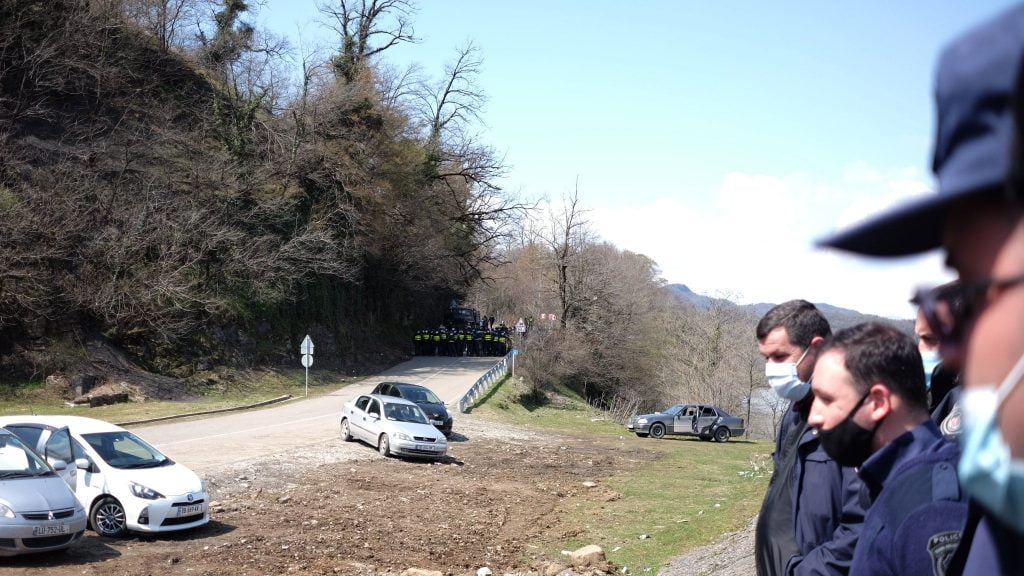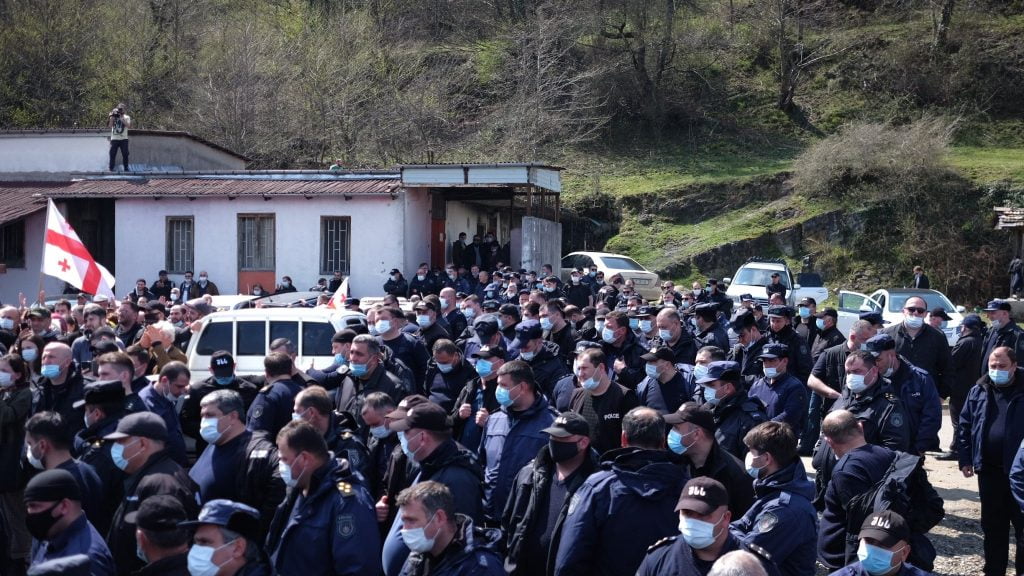Tensions at Namakhvani HPP Site as Works Resume with Police Backing
During the weekend, on April 3-4, tensions ran high between the construction company and locals, backed by activists, in Georgia’s Rioni River valley, as the new director of the Namakhvani HPP construction, Merab Lominadze arrived with the heavy police backing to resume the groundworks. Lominadze and the opponents of construction exchanged heated arguments near the construction site in Namakhvani.
In the meantime, the police prevented other activists from joining by blocking the entrances to vehicles from both the southern, Kutaisi, and northern, Lechkhumi directions leading to the valley. The police reportedly also prevented the protesters’ defense lawyers – Nora Murghulia and Dali Sulakvelidze – from driving to their destination. The lawyers continued on foot to meet the locals. The Ministry of Interior said they detained two anti-HPP activists on April 3, for resisting police. They were later released.
The journalists reporting from the area have confirmed cellular network and internet outages on April 3. Social media has been widely and effectively used by activists to inform their supporters and the media in the capital. While some activists argued that the police have deployed jamming equipment, the Ministry of Interior denied the allegations, saying the specialized vehicles spotted by the activists were deployed to ensure unimpeded work of the police radio frequencies. Activists are currently asking the cellular operator MAGTI, which ensures local cellular and internet coverage, to clarify the reasons for April 3 outages.
In another controversial development that triggered the protesters’ outrage, the police reportedly fined the activists – who were stranded on their way to Namakhvani due to police cordons – for breaking the pandemic-related curfew.
New Director, Activists Trade Barbs
Merab Lominadze is the new director of ENKA Renewables, a company that holds a contract to construct the HPP, with 90% of the shares belonging to the Turkish ENKA Insaat ve Sanayi A.S and 10% to the Norwegian Clean Energy Group. He told the protesters that his task is to resume construction works.
“I could come to here without asking permission from anyone and really [use] those police batons… but I am against the confrontation escalating to that level,” the director told the gathered locals and activists upon his arrival on April 3.
The activists said they would like to speak with Prime Minister Irakli Garibashvili, not the company director. “The company director or manager has never been primary addressee of ours [concerns]. Our demands are bigger than what [the director] could address,” local activist leader Marita Museliani told journalists, adding that Lominadze’s “arrival here together with the police reinforcement is simply a threat.”
Lominadze denied the intention to intimidate the protesters, arguing their concerns are misplaced, since only the preparatory works would commence, while the construction of the HPP dam and reservoir are to undergo further research and scrutiny. Activists respond that even the preparatory works could inflict “irreparable damage” to the ravine and the environment.
The next day, on April 4, activists organized an impromptu rally in Gumati village, at the southern entry point of the valley, as the police continued to block access to Namakhvani. The riot police and a water cannon were deployed, but the rally concluded without any incident.


Prevented from accessing the tents that serve to ensure makeshift permanent presence at Namakhvani, the activists erected new tents in Gumati. They also floated the idea of hosting a rally against the HPP project in the capital, Tbilisi.
Alleged Rights Violations, Reactions
The Coalition for Media Advocacy, a group of CSOs, decried the apparent internet outages at the protest site and called on the government to respect the constitutionally guaranteed right to the freedom of information, considering high public interest towards the events.
In another letter, three local CSOs – GYLA, Green Alternative, and Center for Social Justice (former EMC) demanded the police to immediately leave the area and called on the construction company to halt the works. The CSOs said the works began with grave human rights violations and by neglecting the promises made by the government the local population. The CSOs said the state is using “the police competencies that were given to for ensuring the protection of human rights and social justice against its own citizens’ interests and freedoms.”
The Office of the Public Defender on April 4 said the Interior Ministry “practically deprived the citizens of the opportunity to participate in the assembly due to the restrictions of the freedom movement,” noting that it “did not provide substantiated information about the real and immediate threats” which could have justified imposing such restrictions.
The Public Defender also touched upon the police’s reported use of radio jamming devices that led to “hindering of the [freedom of] expression and dissemination of information” and asked for clarifications.
On its part, ENKA Renewables, addressed the Public Defender to study “the facts of pressure and threats against our employees and their family members,” which reportedly led many who reside in the area “to leave work and leave their families without the guaranteed income.”
The company also said that “due to the low level of political culture displayed by one part of the protest participants, their protest goes beyond the frames of the freedom of expression” and expresses itself in “an acute psychological pressure” on the company employees. They said to be in possession of “numerous video proofs” where the protesters are threatening “physical destruction” of the company managers “especially from other countries.”
The company called on the Public Defender to investigate “xenophobic and other discriminatory statements” by the activists. Lominadze, the company director also accused the project opponents of threatening their employees’ physical security.
Background
The activists, CSOs, and locals against the project, on the other hand, cite the seismic and other natural disaster risks, potential environmental damage, the contractual conditions that allow the investor to confiscate private property and utilize natural resources, and extensive right to seek the government compensation for damages, as some of their key concerns.
They are also demanding the resignation of Economy Minister Natia Turnava, whose efforts to negotiate with protesters yielded no significant results.
The Namakhvani project encompasses two separate HPPs of 333 MW and 100 MW on the Rioni River. The government hopes to enhance its energy security and to employ up to 1,600 Georgians with the “foreign direct investment in the amount of USD 800 million.”
Earlier Developments:
- Turkish Ambassador’s Namakhvani HPP Remarks Stir Controversy
- Massive Anti-Namakhvani HPP Protest in Kutaisi Demands Economy Minister Resignation
- Massive Rally Held in Kutaisi Against Namakhvani HPP
- Namakhvani Dam, Reservoir to Undergo Additional Safety Checks, Economy Minister Says
- Locals, Police Clash Again over HPP Construction in Imereti
- Namakhvani HPP Works Resume Defying Local Protest
This post is also available in: ქართული (Georgian) Русский (Russian)